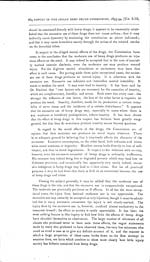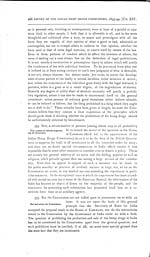Medicine - Drugs > Report of the Indian Hemp Drugs Commission, 1894-1895 > Volume I
(299) Page [265]
Download files
Individual page:
Thumbnail gallery: Grid view | List view
![(299) Page [265] -](https://deriv.nls.uk/dcn17/7443/74435012.17.jpg)
CHAPTER XIV.
THE POLICY OF HEMP DRUG ADMINISTRATION.
General principles
regarding sump-
tuary laws and their application to
India.
553. The question of
prohibiting the growth of the hemp plant and the sale
of ganja and allied drugs is
one which stands in the
forefront of the present inquiry. It has been
remarked by a well known historian* that "no laws
are of any service which are above the working level of public
morality, and
the deeper they are carried down into life, the larger become the
opportunities of
evasion." If these words are true as applied to England under a
feudal system,
they are much more true in the present day as applied to British
India. The Gov-
ernment of this country has not grown out of the forces contained
within it, but
has been superimposed upon them, and the paternal system of
government
which may have been suitable in England during the sixteenth
century, and in
the initial development of some Indian provinces during the period
immediately
following their annexation, becomes purely visionary when public
opinion is in
process of formation and the needs of the people are year by year
finding more
ready expression. Occasionally, no doubt, the Legislature in India
has anti-
cipated a standard of morality not universally accepted by the
people, as in
the case of laws relating to infanticide or the burning of Hindu
widows; but these
measures were passed under an overwhelming sense of the necessity
of correct-
ing popular notions of morality in matters coming well within the
sphere
of Government, and in the assurance that in the course of time they
could
not fail to secure the assent of all intelligent members of the
community.
In the chapter of Mill's Political Economy which treats of the
non-inter-
ference principle, a distinction is made between two kinds of
intervention by
the Government—the one authoritative interference, and the other
giving advice
or promulgating information. And the following remarks are made
regarding
the former: "It is evident, even at first sight, that the
authoritative form of
Government intervention has a much more limited sphere of
legitimate action
than the other. It requires a much stronger necessity to justify it
in any case,
while there are large departments of human life from which it must
be unre-
servedly and imperiously excluded. Whatever theory we adopt
respecting
the foundation of the social union, and under whatever political
institutions we
live, there is a circle around every individual human being which
no Government,
be it that of one, or of few, or of the many, ought to be permitted
to overstep:
there is a part of the life of every person who has come to years
of discretion
within which the individuality of that person ought to reign
uncontrolled either
by any other individual or by the public collectively. That there
is, or ought to
be, some space in human existence thus entrenched around no one who
professes
the smallest regard to human freedom or dignity will call in
question: the point
to be determined is where the limit should be placed; how large a
province of
human life this reserved territory should include. I apprehend that
it ought to
include all that part which concerns only the life, whether inward
or outward, of
the individual, and does not affect the interests of others, or
affects them only
through the moral influence of example. With respect to the domain
of the in-
ward consciousness, the thoughts and feelings, and as much of
external conduct
*J. A. Froude's History of England, 2nd Edition, Chapter I, page 57.
67
Set display mode to: Large image | Zoom image | Transcription
Images and transcriptions on this page, including medium image downloads, may be used under the Creative Commons Attribution 4.0 International Licence unless otherwise stated. ![]()
| India Papers > Medicine - Drugs > Report of the Indian Hemp Drugs Commission, 1894-1895 > Volume I > (299) Page [265] |
|---|
| Permanent URL | https://digital.nls.uk/74574664 |
|---|---|
| Description | Chapter XIV |
| Description | [Volume 1]: Report. |
|---|---|
| Attribution and copyright: |
|




